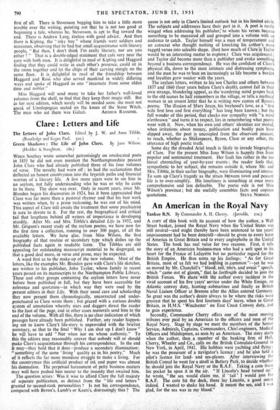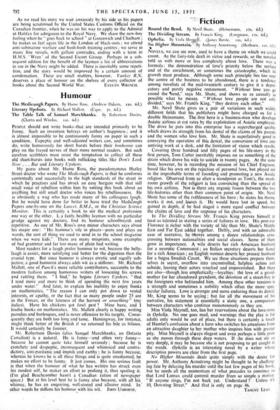An American in the Royal Navy Yankee R.N. By Commander
A. H. Cherry. (Jarrolds. its.) A COPY of this book with its account of how the author, a Wall Street banker, joined the Royal Navy when the 'United States was still neutral—and might thereby have been sentenced to ten years' imprisonment had he been detected—should be given to every hater of America in Great Britain and to every anglophobe in the United States. The book has real value for two reasons. First, it tells the story of an American business-man who had a soft spot in his heart for the France of Lafayette but no particular regard for the British Empire. He thus sums up his feelings: " As for Great Britain, most of us felt we had Sighing in (common "—yet he was so moved by Mr. Churchill's " blood, toil, tears, and sweat " speech, which " came• out of gloom," that he forthwith decided to join the British Forces. We share with the author every incident in the vivid account of his five years' service under the White Ensign, on Atlantic convoy duty, hunting -submarines and finally as British Naval Liaison Officer at Bremen after the Allies entered Germany. So great was the author's desire always to be where the risks were greatest that he spent his first fourteen days' leave, when in Great Britain, in H.M.S. Winchester' on East Coast Convoy duty, just to gain experience. Secondly, Commander Cherry offers one of the most moving tributes ever paid by an American to the officers and men of the Royal Navy. Stage by stage we meet the members of the Senior Service, Admirals, Captains, Commanders, Chief-engineers, Medical Officers and Midshipmen, as seen. by an American. The story starts when the author, then a member of the banking firm of Hall. Cherry, Wheeler and CO., calls on the British Consulate-General in New York, in April, 1941. His hobbies were yachting and flying he was the possessor of a navigator's licence ; and he also held a pilot's licence for land- and sea-planes. After interviewing the British Consul he went for a stroll in Battery Park, to decide whether he should join the Royal Navy or the R.A.F. Taking a coin from his pocket he spun it in the air. "If Lincoln's head turned up." he wrote, " the sea would claim me, if tail ' I would join the R.A.F. The coin hit the deck, there lay Lincoln, a good omen indeed. I wanted to shake his hand. It meant the sea, and I was glad, for the sea was in my blood." As we read his story we wait anxiously by his side as his papers are being scrutinised by the United States Customs Official on the Canadian frontier, when he was on his way to apply to the Admiral at Halifax for admission to the Royal Navy. We share the new-boy feeling when he " goes back to school " at Greenwich and Chatham ; he makes us feel again life in the London of black-outs ; we attend anti-submarine warfare and hush-hush training centres ; we serve in many fine vessels. with gallant comrades, ending with a term in H.M.S. ' Wren' of the Second Escort Group. Perhaps in a sub- sequent edition for the benefit of the layman a list of abbreviations in use in the Navy might be added. There is inevitably some repeti- tion, and the story would be improved by a certain amount of condensation. These are small matters, however. Yankee R.N. deserves a place of honour on the shelves of every collector of
books about the Second World War. EVELYN WRENCH.



































 Previous page
Previous page